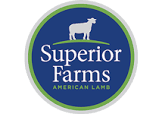Superior Farms

Estimated electricity consumption
N/A
Countries of production presence
N/A
Superior Farms is a leading American company in the animal processing sector, with a strong commitment to sustainability and decarbonisation. Founded in 1963, the company has grown to become one of the largest lamb processors in the United States, with a reputation for quality, innovation, and environmental responsibility.
Superior Farms has long recognized the importance of reducing its carbon footprint and transitioning to renewable energy sources. The company has implemented a range of initiatives to achieve this goal, including investing in energy-efficient equipment, reducing waste and water usage, and sourcing renewable energy through corporate power purchase agreements (PPAs).
One of Superior Farms' most significant sustainability achievements is its corporate energy program, which aims to reduce the company's energy consumption and carbon emissions through a range of measures. These include upgrading lighting and HVAC systems, installing solar panels on company facilities, and implementing energy-efficient practices throughout the supply chain.
Through its corporate energy program, Superior Farms has achieved significant reductions in energy usage and carbon emissions. The company has reduced its energy consumption by 20% and its carbon emissions by 25% since 2015, and it aims to further reduce its carbon footprint by 50% by 2030.
One key element of Superior Farms' corporate energy program is its use of corporate PPAs to source renewable energy. A corporate PPA is a long-term agreement between a company and a renewable energy provider, in which the company agrees to purchase a set amount of renewable energy at a fixed price over a specified period.
Superior Farms has entered into several corporate PPAs to source renewable energy for its operations. In 2018, the company signed a 20-year agreement with a wind farm in Oklahoma to purchase 50 MW of wind energy, which will provide approximately 90% of the company's electricity needs. The wind farm is expected to begin operations in 2020 and will help Superior Farms achieve its goal of sourcing 100% of its electricity from renewable sources.
Superior Farms' commitment to decarbonisation and renewable energy extends beyond its own operations. The company is a member of the Renewable Energy Buyers Alliance (REBA), a coalition of leading companies working to accelerate the transition to renewable energy. Through its membership in REBA, Superior Farms is able to collaborate with other companies to drive demand for renewable energy and advocate for policies that support decarbonisation.
In addition to its corporate energy program and use of corporate PPAs, Superior Farms has implemented a range of other sustainability initiatives. The company has invested in water-saving technologies, such as low-flow fixtures and water-recycling systems, and it has implemented a zero-waste program to reduce waste and increase recycling. Superior Farms also works closely with its suppliers to ensure that they meet the company's sustainability standards and adhere to ethical and humane animal welfare practices.
Superior Farms' commitment to sustainability and decarbonisation has earned the company recognition and awards from a range of organizations. In 2019, the company was named a finalist in the Circulars Awards, which recognize companies that are driving innovation and sustainability in the circular economy. Superior Farms was also named a winner of the 2019 California Green Medal, which recognizes leaders in sustainable winegrowing and winemaking.
In conclusion, Superior Farms is a leading American company in the animal processing sector, with a strong commitment to sustainability and decarbonisation. The company has implemented a range of initiatives to reduce its carbon footprint and transition to renewable energy sources, including its corporate energy program and use of corporate PPAs. Superior Farms' commitment to sustainability has earned the company recognition and awards from a range of organizations, and it serves as a model for other companies in the animal processing sector and beyond.